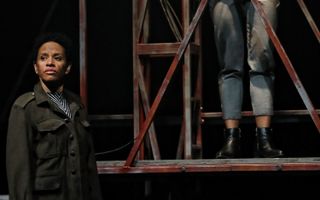 Watch
Watch
Who is the main character of the play?
Although the play is called Julius Caesar, the title character dies halfway through the play. So, who then would we consider to be the main character? Caesar, Antony, Cassius and Brutus all have strong claims to centrality.
Caesar (Speaks 135 lines) His is the title role, and although he has fewer lines than the other parts, Caesar’s shadow hangs over the entire play. During the final battle, when Brutus hears that Cassius has killed himself, he declares:
O Julius Caesar, thou art mighty yet!
Thy spirit walks abroad and turns our swords
In our own proper entrails.
Act 5, Scene 3
Even when Caesar is not physically present on stage, the consequences of his life and death influence everything that happens in the play – he is mentioned more than any other character. Caesar’s character is mostly built through his interactions with other characters, rather than through direct address to the audience, although he has a brief, three-line soliloquy in Act 2, Scene 2 about the storms that have ripped through the Capitol and his wife Calphurnia’s disturbed sleep.
Brutus (728 lines) has the most stage time and the most to say. He is the moral centre of the play and his decision to join with the conspirators in killing Caesar is given a huge amount of weight. Brutus connects with the audience through a key soliloquy in Act 2, Scene 1, in which he lays out the justification for killing Caesar. It is Brutus’ journey we follow, his decisions we consider and his downfall we mourn, much like we do the flawed heroes of Shakespeare’s later tragedies – Macbeth, Othello, Hamlet, and
King Lear. Like all those leading characters, we are left with Brutus’ dead body on stage at the end of the play. Mark Antony declares that Brutus was “the noblest Roman of them all” (Act 5, Scene 5).
Antony (329 lines) Of the four candidates, Antony is the only one left standing at the end of the play. Along with Octavius, he gets to shape the future, and rewrite the past. Early on, Antony is dismissed by Brutus:
And for Mark Antony, think not of him,
For he can do no more than Caesar's arm
When Caesar's head is off.
Act 2, Scene 1.
But Brutus underestimates Antony’s extraordinary passion and determination. Antony connects with us in a powerful soliloquy (“O pardon me, thou bleeding piece of earth” – Act 3, Scene 1) and his oration to the crowd is a tour de force, containing the play’s most famous line: “Friends, Romans, countrymen, lend me your ears” (Act 3, Scene 2). Antony goes on to be a central character in Shakespeare’s sequel to Julius Caesar, Antony and Cleopatra.
Cassius (525 lines) mirrors Othello’s Iago in his central role as antagonist and manipulator, bringing together the conspirators and plotting the death of Caesar. In a soliloquy in Act 1, Scene 2, he establishes a special relationship with the audience in which he reveals that he means to manipulate Brutus. He is a realpolitik
strategist, and on three occasions comes up with a pragmatic course of action that could lead to success, only to be overruled by Brutus’s idealism: 1. Suggesting Antony be dispatched along with Caesar; 2. Warning against allowing Antony to speak at Caesar’s funeral; and 3. Suggesting the conspirators’ armies hold position instead of marching on Philippi. Cassius’ tactics in drawing Brutus into the conspiracy are masterful. He is a charming storyteller, hot-headed and passionate, and in his quarrel with Brutus in Act 4, Scene 3, he lays out clearly why he believes the ends always justify the means.




